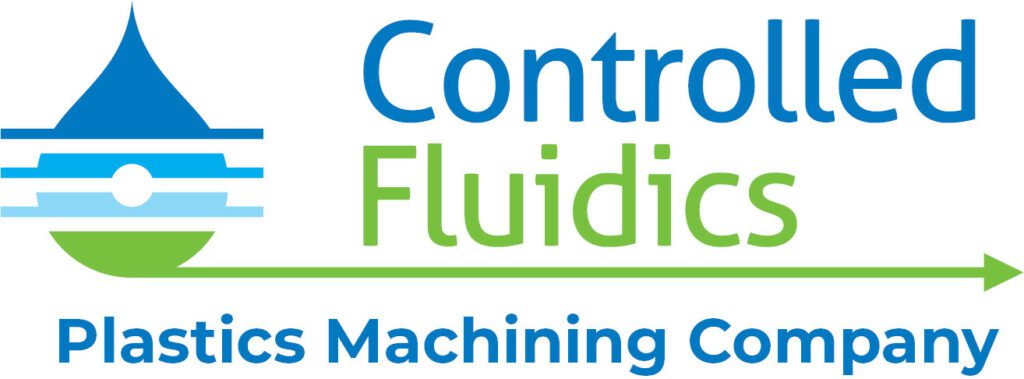Plastic Machining Projects: Five Plastics that Can Take the Heat
5 Plastic Resins/Materials That Can Take The Heat
A successfully completed high-performance plastic machined part or manifold performs consistently well under even the most stressful conditions. In addition, professional machining and polishing prevent dangerous, costly malfunctions.
While final success depends on many factors falling into place, selecting the right material for the job is essential to get you on the right track. The light, durable plastics we use are excellent alternatives for materials like metal and ceramics.
At Controlled Fluidics, our engineers are well-versed in the many extreme environments in which our plastic machined parts and manifolds will need to perform.
We’ve found that of the most common environmental factors our components need to overcome is extreme heat. To solve that problem, we have certain plastics that we recommend time and time again.
Below are five plastics our engineers regularly use to handle even the most extreme temperatures, and some examples of how Controlled Fluidics has used plastics in various projects.
 COC/COP
COC/COP
COC/COP (cyclic olefin copolymer) is an amorphous polymer known for its high heat resistance, exceptional transparency, low birefringence, and a high Abbe number. These qualities, specifically COC/COP’s chemical resistance, and clarity, make COC/COP a great choice for microfluidics projects. Specifically, the Controlled Fluidics engineers select COC/COP for life science diagnostic equipment – including cell counters – that require a combination of heat resistance, high clarity, and low fluorescence. COC/COP components are also used in industries like packaging, healthcare, electronics, and optics.
PEEK
PEEK is a high-performance semi-crystalline thermoplastic that is a fantastic choice for plastics that need to operate in extremely high temperatures, including environments with steam or hot water. Able to operate continuously up to 480F with a melting point of 700F, PEEK is frequently used in the aerospace industry. Specific applications include bushings, wear rings, seals, and bearings.
PEEK is very hard and strong with immense tensile strength, able to perform well in high load, stressful environments without warping. This makes PEEK a good alternative for metal for many uses. Keeping its unique qualities in mind, the engineers at Controlled Fluidics specifically recommend PEEK for all high-temperature aggressive fluid handling applications. PEEK’s high temperature resistance can make it difficult to process, but Controlled Fluidics’ engineers have the skill, experience, and tools to make working with PEEK not only achievable but a routine way to show excellence.
 Radel
Radel
Radel-machined parts offer an unmatched combination of high-performance characteristics, including heat deflection to temperatures up to 400F.
Radel’s superior heat deflection properties, along with outstanding durability and environmental stress resistance allow it to withstand unlimited steam sterilization cycles without warping or cracking. This makes Radel a good alternative to metals like brass for handling pressurized water.
As a result, Radel machined parts are commonly found in the medical or research industries, a reality that is supported by the types of projects that find Controlled Fluidics recommending Radel.
We utilize Radel for any project that requires repeated steam sterilization, including surgical tools like instrument handles, trays, and other reusables. Radel components are perfect for use in food service. It makes items like coffee machines, steamers, and fryers safer and longer-lasting. Radel is also compliant with Federal Aviation Administration (FAA) regulations for aircraft cabins for its low gas emission and low heat release properties. Molded-in color is available.
Teflon
A familiar choice for nonstick items like cooking utensils, Teflon is a versatile material with a wide range of applications. It possesses one of the lowest friction coefficients of any solid currently known. Teflon machined components can continuously operate in temperatures up to 500F.
It’s high heat resistance combined with excellent chemical and electrical properties make Teflon an ideal choice for projects geared towards both industrial and commercial applications. Teflon machined parts are particularly valuable in the medical and research industries. More of Teflon’s qualities include high tensile strength, chemical inertia, hydrophobia, and borderline insolubility in acids or alkalis. Our engineers utilize Teflon for successful projects requiring high purity gas chromatography applications.
Torlon
Torlon machined polyamide components perform exceptionally well in temperatures up to 500F. Although difficult to machine, Torlon’s dimensional stability, low creep, and compressive strength make for a wide variety of useful applications. Also, Torlon operates under high friction and shows excellent wear resistance in high-stress environments.
Torlon is found in two varieties – Torlon 4203 and Torlon 4301. Of the two, Torlon 4301 is most commonly used for projects that require resistance to wear at high temperatures. Torlon machined parts are frequently used in the aerospace and medical industries. Fasteners, additives, power train parts, and more are all materials crucial to safety and productivity that are produced with machined Torlon. At Controlled Fluidics we’ve used Torlon for projects requiring high PV bearing applications in demanding conditions.
Support for Material Selection
Which plastics are your go-to when a project needs to operate in extreme heat? Although all of the above plastics perform well under extreme heat conditions, their other unique qualities help direct the specific types of projects that they are recommended for.
Controlled Fluidics engineers will consider every aspect of a project before making material recommendations, and our customers can count on receiving a durable component that will perform consistently in its environment. These are just a small sampling of the plastics we find ourselves returning to again and again when machining parts that require extreme heat resistance.
Ready to get started?
Reach out now and get your project started with a no-obligation conversation!

 COC/COP
COC/COP Radel
Radel